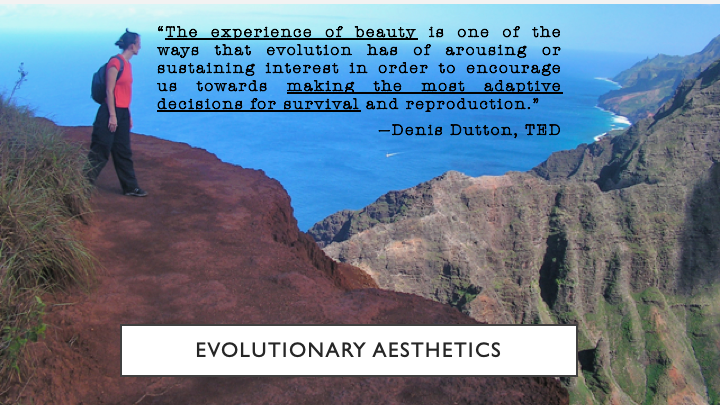Aesthetics
"Beauty follows from what is good, and art inspires us to be so."
On my Philosophy 101 page, I wrote that aesthetics is the branch of philosophy dealing with the nature of beauty, art, taste, and the creation and appreciation of beauty. It is more scientifically defined as the study of sensory or sensori-emotional values, sometimes called judgments of sentiment and taste.
In 2010, the philosopher Denis Dutton gave a TED talk titled “A Darwinian Theory of Beauty” that included this quote:
In 2010, the philosopher Denis Dutton gave a TED talk titled “A Darwinian Theory of Beauty” that included this quote:
“The experience of beauty is one of the ways that evolution has of arousing or sustaining interest in order to encourage us towards making the most adaptive decisions for survival and reproduction."
That's a wonderful descriptive statement of what evolution has done for our sense of aesthetics. But I believe we can take that farther now and derive normative statements from our evolutionary history and decide what it is we ought to consider beautiful. I argue for this in two essays on aesthetics from my series on how to know thyself:
What is Beautiful is What is Good
The Purpose of (My) Art
In summary, the longstanding and pervasive view that "beauty is in the eye of the beholder" seems to suggest that aesthetics is only a subjective field filled with personal judgments from sensitive souls set inside an influencing landscape of cultural relativism. But at its heart, beauty is a word we use to name qualities that we like, that move us, that please us. Building on an evolutionary ethics that defines good as "that which promotes the long term survival of life," how can we really like something that is bad, something that goes against this? As I wrote in the 1st version of evolutionary philosophy:
What is Beautiful is What is Good
The Purpose of (My) Art
In summary, the longstanding and pervasive view that "beauty is in the eye of the beholder" seems to suggest that aesthetics is only a subjective field filled with personal judgments from sensitive souls set inside an influencing landscape of cultural relativism. But at its heart, beauty is a word we use to name qualities that we like, that move us, that please us. Building on an evolutionary ethics that defines good as "that which promotes the long term survival of life," how can we really like something that is bad, something that goes against this? As I wrote in the 1st version of evolutionary philosophy:
|
What promotes the long-term survival of life? Knowledge. Health. Progress. Stability. Exploration. Efficiency. Brightness. Abundance. Comfort. Security. Fecundity. Clarity. These are beautiful and good. What threatens the long-term survival of life? Ignorance. Disease. Stagnation. Conflict. Chaos. Isolation. Waste. Darkness. Scarcity. Discomfort. Vulnerability. Barrenness. Obscurity. These are ugly and bad. Objects have many qualities. Depending on the context, focus, and cognitive appraisal of the observer, objects can be either beautiful or ugly. This is why the idea of beauty may be objective compared to general reality, but the beauty of an object is subjective to the specific observer.
|
For examples of this in action, please see my fiction and let me know whether you consider that beautiful or not.
Also, see Why I’m Done with the Publishing Industry for My Fiction.
Also, see Why I’m Done with the Publishing Industry for My Fiction.
Further Reading
For more details on my evolutionary aesthetics, here are some other essays I have written:
- The Philosophical Novelist, Ed Gibney: Always Evolving — An author interview at Bibliotekos
- Q&A for my novel Draining the Swamp
- Turns Out Atlas Can Hug Too
- Atlas Hugged and Evolutionary Philosophy — This is a long wiki.letter exchange I had with the eminent evolutionary biologist David Sloan Wilson about his new novel Atlas Hugged.
- Deep Philosophical Confusions Among Artists and Critics
- The summary section on aesthetics in What I Learned From 100 Philosophy Thought Experiments.
- Each individual thought experiment from that series that dealt with aesthetics:
- #48 Evil Genius
- #37 Nature the Artist
- #86 Art for Art’s Sake
- #66 The Forger
- What Can Philosophy Say About Sports Today?
Subscribe to Help Shape This Evolution
© 2012 Ed Gibney

